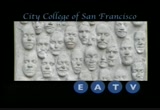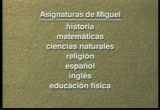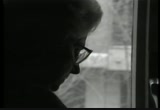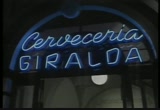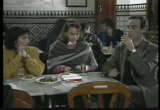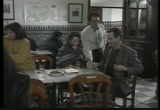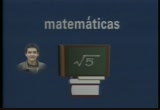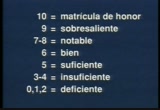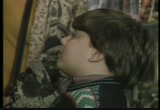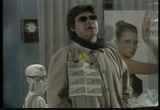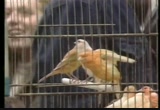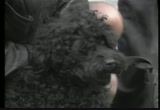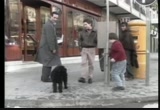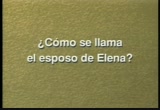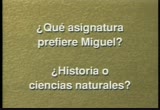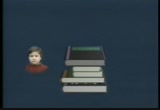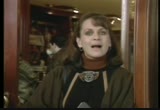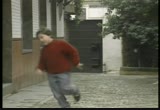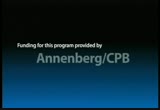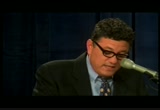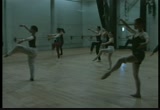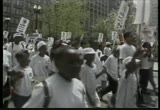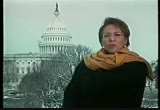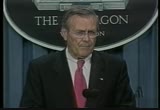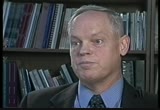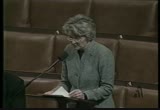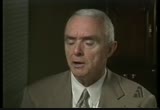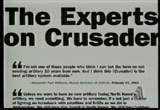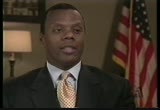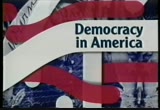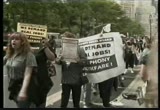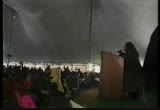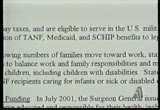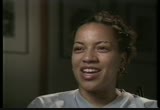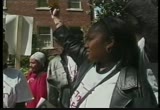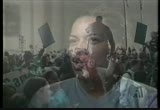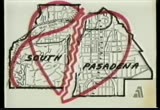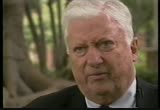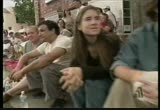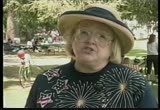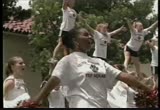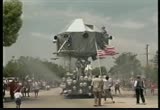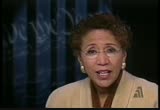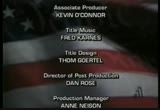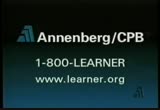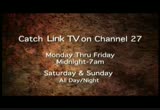tv Democracy Now Special LINKTV November 16, 2012 4:00pm-5:00pm PST
4:00 pm
annenberg media ♪ narrator: welcome to destinos: an introduction to spanish. as our story unfolds most of what you hear will be in conversational spanish. bueno, es un poco tarde. tenemos que irnos. sí, es tarde, es verdad. camarero, por favor. hay un mensaje para ud., señora. you will not understand every word you hear. let the actions and the situations guide your understanding. tengo que hacer una llamada de larga distancia. tengo que llamar a méxico.
4:01 pm
eh, muy bien. ¿adónde? a la ciudad de méxico. at other times, you will hear narration in spanish that is spoken just for you. narrador: miguel va al colegio de san francisco de paula. miguel es un buen estudiante. estudia mucho. as you enjoy the story, you will also learn the names of certain school subjects in spanish. tu mamá dice que tienes siete asignaturas. ¿qué materia te gusta más? bueno, realmente me gustan todas pero la verdad es que mis favoritas son las ciencias naturales. tengo unos minutos, y voy a apuntar... at the end of the episode raquel will review some of the story with you. primero. ¿cómo se llama el esposo de elena?
4:02 pm
hola. yo me llamo miguel. se llama miguel. sit back now, and relax, as we join raquel on her journey through spain. ijaime! ijaime! ijaime! iosito! captioning of this program is made possible by the annenberg/cpb project and the geraldine r. dodge foundation. this is sevilla, a city in southern spain. this is raquel rodríguez a lawyer from southern california.
4:03 pm
ud. no es española, ¿verdad? no, no. soy de los estados unidos. why is raquel here? ( timbre suena ) what has brought her to spain... and to sevilla? ( timbre suena ) esta señorita busca a la abuela. ( campanas suenan ) raquel: esta carta... se le escribió la señora suárez a mi cliente, don fernando castillo. mi cliente, don fernando, vive en méxico. está gravemente enfermo. antes de la guerra civil conoció a una mujer joven y bella-- rosario. rosario era amiga de teresa suárez. don fernando siempre creyó que rosario había muerto en la guerra pero la señora suárez dice que no
4:04 pm
y además, don fernando cree que tiene un hijo con rosario. ¿sabe ud. algo de esto? todo esto es nuevo para mí. ¿la señora suárez nunca le habló de rosario o de don rnando? no... nunca... jamás. and so raquel must now talk to miguel ruiz, elena's husband and son of teresa suárez. hola, elena. este es mi esposo, miguel ruiz. mucho gusto, miguel. mucho gusto. ¿qué va a tomar? ¿un vino? ¿una cerveza? aquí sirven un fino estupendo. raquel: ¿un fino? sí, el jerez es un vino fino. un fino está bien. ioiga! un fino para la señorita, por favor. la especialidad de la casa es la tortilla española.
4:05 pm
la tortilla española se hace con patatas, huevos y cebolla. primero se calienta el aceite y después, se fríen las cebollas. papá... ¿sí? ¿podemos salir? sí, pero cuidar de tu hermano, ¿eh? se agrega sal a los huevos, y éstos se baten. se mezcla todo junto, y se fríe. se voltea la tortilla, y se acaba de cocinar. se corta... y se sirve. gracias. pruebe la tortilla.
4:06 pm
mmm... está rica. tome unas aceitunas. gracias. miguel... ¿elena le ha contado lo de la carta? sí, y además ya hablé con mi madre por teléfono. earlier in the day, miguel had called his mother to tell her about raquel's investigation. aquí está una señorita de los estados unidos. tiene una carta tuya que le escribiste a un señor en méxico. ¿y qué dijo? ¿mencionó algo de rosario? realmente, no. ¿dijo algo de mi cliente, don fernando? no, no dijo nada. mi cliente, don fernando, quiere saber qué pasó con rosario. ¿podría yo hablar por teléfono con su madre? no creo. mi madre prefiere que ud. vaya a madrid.
4:07 pm
¿quieres que te llame por teléfono? suárez: dile que me visite a madrid. ¿a madrid? pero mamá... suárez: nada de "peros". dile a esa señorita que vaya a verme a madrid. ¿a madrid? entonces, tengo que ir. pues, si está de viaje... voy a ver si puedo salir para madrid mañana. mañana, no. ¿por qué no? porque mi madre no está ahora en madrid. ¿dónde está? en barcelona, con uno de mis hermanos. ¿y cuándo regresa a madrid? pasado mañana. raquel: "pasado mañana". the day after tomorrow is the day raquel will finally meet teresa suárez and discover the truth about rosario. raquel says she will travel by plane to madrid.
4:08 pm
¿avión? no, no. debe tomar el tren. sí, es verdad. para conocer españa, debe viajar en tren. bueno, es un poco tarde. tenemos que irnos. sí, es tarde, es verdad. camarero, por favor. ¿cuánto es? mil doscientas. muchas gracias. gracias. ¿piensa volver al hotel ahora? sí. pensaba tomar un taxi. nada de taxi. vamos a caminar. el aire está fresco. it's a beautiful night in sevilla. and even though it's 8:00, people are out shopping. young miguel remembers something he needs for school. mamá, ¿me da doscientas pesetas para comprar una carpeta?
4:09 pm
4:10 pm
¿qué materia te gusta más? bueno, realmente me gustan todas pero la verdad es que mis favoritas son las ciencias naturales. ¿ciencias naturales? ¿quieres ser científico? sí, me gustan mucho todas las ciencias. miguel es muy serio y es muy buen estudiante. como dice elena, miguel es muy buen estudiante. el sistema de calificación de los exámenes es de diez puntos. una nota de diez puntos es excelente. una nota de cero, uno o dos es muy mala.
4:11 pm
4:12 pm
su materia favorita es la educación física. ¿y eres buen estudiante? sí, pero no me gusta mucho la escuela. ¿no quieres ser científico como tu hermano? no, quiero ser guía turístico como mi papá. hombre ( cantando ): me quedan noches iguales para... on their way to raquel's hotel the boys see a man selling lottery tickets and decide to buy one. ¿podemos comprar un cupón? elena: sí, ¿cómo no? me da todo de uno, por favor. after the ruiz family and raquel enjoy their stroll they arrive at raquel's hotel, where elena suggests that raquel join them the next day for their trip to the pet fair. raquel, mañana vamos al mercadillo de animales. ¿quiere venir? sí, claro. ¿le gustan los animales? por lo general, me gustan mucho-- sobre todo, los perros. bueno, pues, vamos todos.
4:13 pm
de acuerdo. ¿por qué no pasamos por ud. a las diez de la mañana? ¿vale? perfecto. hasta mañana. hasta mañana, y muchas gracias por todo. hasta mañana, raquel. hasta mañana. mucho gusto, miguel, y gracias de nuevo. ha sido un placer. hasta mañana. jaime, dale un beso a raquel. adiós, jaime. hasta mañana. quiero la llave de la habitación 415. muy bien, señorita. hay un mensaje para ud., señorita. ah, gracias. tengo que hacer una llamada de larga distancia. tengo que llamar a méxico. eh, muy bien. ¿adónde? a la ciudad de méxico. el número es dos... dos... veintiuno...
4:14 pm
veintiuno... treinta... treinta... doce... doce. muchas gracias. ( teléfono suena ) bueno. ah, sí, sí. gracias. hola, raquel. ¿me oyes? hola, pedro. ¿cómo estás? pedro: sí, muy bien, raquel, ¿y tú? ¿cómo va todo? pues, yo estoy bien pero la señora suárez ya no vive en sevilla. vive en madrid, con uno de sus hijos. pedro: ¿vas a madrid entonces? sí, pero no mañana. resulta que la señora suárez está en barcelona con otro de sus hijos. sí, sí, comprendo. no hay ningún problema. ve a madrid, y llámame cuando puedas. por supuesto, pedro... pedro: muy bien. pues, que disfrutes tu estancia en españa. gracias, pedro. saludos a don fernando. pedro: gracias, raquel.
4:16 pm
4:17 pm
al día siguiente, raquel y la familia ruiz van al mercadillo de los animales... ijaime, mira, mira! en la plaza alfalfa. allí venden animales de todo tipo: peces tropicales... y pájaros, como canarios... loros... y patitos. también venden tortugas... gatos... y por supuesto, perros. mire este perrito, mamá. ¿cuánto vale este perro? cinco mil pesetas. as in many open-air markets in spain and other countries it is expected that some bargaining will take place. in the mercadillo de animales, miguel bargains
4:18 pm
with a pet owner. parece enfermo. tres mil ochocientas. and finally, they agree on a price. se lo dejo en cuatro mil. cuatro mil está bien. ¿y cómo se llama tu perro, jaime? tienes que ponerle un nombre. no sé. ¿por qué no le pones "einstein"? i"einstein"! ese no es nombre de perro. le voy a poner "osito". raquel: "osito" me gusta mucho. es un buen nombre. me parece muy apropiado. a ver si lo cuidas bien, ¿eh? tener un perro es una gran responsabilidad. jaime: sí, papá. y ahora, ia celebrar! ¿por qué no vamos a esa pastelería de allí? raquel y la familia ruiz entran en la pastelería del mercado. en este lugar, se venden pasteles de todo tipo y también, unos muy especiales
4:19 pm
en formas de peces... pájaros... gatos... y perros. jaime, osito no puede entrar. tú debes atarlo bien a este poste. sí, papá. elena: yo no quiero pastel. ah, ya empezamos. ¿tú quieres? yo, de nata. nata, ¿y tú? ¿hay de fresa? pues, ya la tendrás. ¿vamos? hasta ahora, osito. por favor, unos pasteles. ( perro gañe ) gato, gato. ¿quién quiere un gato? un gatito barato. ¿se fijó en miguel, "el científico"? sí, quería ponerle "einstein" al perro. me dio tanta risa. pues, ya que estamos aquí voy a comprar pan para la cena.
4:20 pm
¿me espera un momento? claro, ¿cómo no? mira... iosito! hola, osito. ay, que solito ha estado. ya estamos aquí. tengo unos minutos y voy a apuntar algunas cosas en mi cuadernito. primero, ¿cómo se llama el esposo de elena? hola. yo me llamo miguel. se llama miguel. soy esposo de elena y soy también hijo de teresa suárez. ¿sabe miguel algo de rosario?
4:21 pm
¿qué tengo que hacer para hablar con la madre de miguel? ¿quieres que te llame por teléfono? dile que me visite a madrid. tengo que ir a madrid. ¿qué me recomienda miguel? ¿debo ir en avión? ¿o debo ir en tren? según la recomendación de miguel debo ir en tren. para resumir el hijo de la señora suárez se llama miguel. miguel no sabe nada de rosario.
4:22 pm
su madre insiste en hablar conmigo personalmente. entonces, tengo que ir a madrid. miguel, que es guía turístico, dice que debo ir en tren. también he conversado con miguel, elena y sus dos hijos. ¿recuerdan algo de miguel? miguel prefiere ciencias naturales. y jaime, ¿también prefiere las ciencias? no, jaime prefiere la educación física. en total, miguel tiene siete asignaturas:
4:23 pm
4:24 pm
¿un pez? ¿un gato? ¿o un perro? jaime compró un perro. ¿y cómo se llama el nuevo perro de jaime? ¿osito o einstein? se llama osito. bien, háblenos, osito. hombre: un gatito barato-- ¿quién quiere un gato? iay, ay, el gato! ieh, oye, el gato! iosito! iven aquí! imiguel! miguel, ¿por qué corres? ielena! iespera un momento! ( ladrando )
4:25 pm
4:26 pm
4:27 pm
4:28 pm
de corretaje cierre, sipc está ahí para protegerlo. sipc. c-i- lo siento, roberto. eso es incorrecto. lisa flores. lisa, tu palabra también es 'sipc'. ¿podría tenerla en otra oración, por favor? los fondos de sipc están disponibles para satisfacer las reclamaciones de los clientes de firmas de corretaje hasta un máximo de $500,000, incluyendo hasta $100,000 por rec 'sipc', eftivo s-i-p-k. ¿no conoce a sipc - securities investor protection corporation? no importa. se lo deletrearemos. visite nos www.sipc.org.
4:30 pm
funding for this program is provided by annenberg/cpb, to advance excellent teaching. poussaint: the term "interest group" tends to have a negative meaning, and some interest groups do present problems for a democracy. but there's a positive side as well. large and small, rich and poor, tightly or loosely organized, interest groups bring pressure on public officials to promote particular policy agendas, which actually enhances democracy by linking citizens directly to their representatives. i'm renee poussaint.
4:31 pm
most long-lasting interest groups in our society focus on advancing the economic well-being of their members. because their members have an economic incentive, they are likely to be well-funded professional organizations which can employ lobbyists, mount well-orchestrated demonstrations, and conduct massive writing, e-mail, and telephone campaigns -- all designed to bring their concerns to the attention of decision makers. this is crusader, built by united defense.
4:32 pm
it was an $11 billion artillery system that triggered an intense battle in the spring of 2002 on capitol hill. critics, led by the secretary of defense, called the system a cumbersome cold war relic and a waste of taxpayers' money. after a good deal of consideration, i've decided to terminate the crusader program. poussaint: the government had already spent $2 billion to develop crusader, but donald rumsfeld was on a mission to transform the military. he wanted to save the remaining $9 billion cost and spend it on new, more agile weapons systems. we must be prepared to adapt to an ever-evolving set of challenges and circumstances. poussaint: but before rumsfeld could officially announce his decision, the army leaked the news to united defense. that leak was the beginning of a highly organized fight
4:33 pm
to save the system. among the observers of the battle, andrew krepinevich, director of a non-partisan think tank. krepinevich: essentially what the administration has run into is the so-called iron triangle. the three sides of the triangle comprise the army itself, the defense industry that is building the crusader -- in this case, united defense -- and members of congress in whose districts they would benefit from the production of this system. poussaint: crusader was being built by united defense. it's a small company, compared with defense industry giants, and the contract was vital to its survival. while a $9 billion program may not seem a lot to a large firm, to united defense, this is big stuff, this is the crown jewel of their corporation. poussaint: united defense may be small by some standards, but it had considerable clout. it was owned by the carlyle group, a secretive but supersuccessful private investment bank
4:34 pm
with a bench long on defense insiders and former world leaders. man: it's headed by a former defense secretary, frank carlucci, and has advisors that include even the former president bush. poussaint: and united defense had another key ally, the u.s. army. the army had waited decades to get a new artillery system and believed they deserved crusader. they passed the news to united defense to gear up for a fight. timing oftentimes is everything, and, of course, if you can get your message out first and you can saturate the airwaves and saturate capitol hill with your message, you've got a better chance, obviously, of getting in the first punch. poussaint: the battle to cancel crusader was not the normal partisan fight. instead, it pitted the secretary of defense against key elements in the army establishment.
4:35 pm
it was a bad decision. rumsfeld, wolfowitz -- patriotic men, dedicated, experienced, and brilliant -- they're wrong on the issue and they're putting the u.s. army's high intensity combat capability at risk. poussaint: that view was shared by the third side of the triangle, key members of congress. 11 billion federal dollars would provide a lot of jobs in the states where crusader was being built. workers in j.c. watts' home district in oklahoma stood to lose jobs. watts: in layman's terms, we call that special interest. well, the only special interest i have in the crusader project is a soldier. poussaint: despite the jobs crusader would bring to his state, watts denied that economics was the driving issue behind his support. gosh, yes, it creates 150 jobs, but, you know, i don't think that should be the driving force
4:36 pm
when we're talking about life and death. poussaint: the administration's abrupt decision to cancel crusader, without debate, was seen by some as heavy-handed and unfair. this is a serious business. there ought to a public debate. congress has the constitutional responsibility to raise and maintain an army. there should have been an informed debate, there wasn't -- it came out of the white house, it was killed, there was no justification given. poussaint: the opinions of four-star generals and gulf war heroes like barry mccaffrey carry a lot of weight in washington. there appears to be no doubt that he believed in crusader. he was hired by united defense to plead its case to congress and the public. i hope people listening to this argument say, you know, look, mccaffrey's been around in uniform for 32 years. he got wounded three times. his son and daughter are both in uniform.
4:37 pm
he sounds like a thoughtful guy, and he's telling us this program's vital. poussaint: united defense's public efforts were orchestrated by power washington pr firm powell tate. they spearheaded the campaign of the crusader industrial alliance, who stood to lose billions if crusader was cancelled. the alliance paid for an ad campaign and a slick web site which offered talking points, even videos, touting crusader's virtues. it's a campaign, it's just like a political campaign, it's run the same way and some of the same tactics apply and it's very high-energy. this is a very sophisticated, broad-based, well-funded attempt to essentially overturn the secretary of defense's decision to kill the crusader program. poussaint: meanwhile, united defense's paid lobbyists were on the job on capitol hill, targeting members whose constituents had a stake in the fight.
4:38 pm
and lobbyists can be expensive. for hundreds of thousands or millions of dollars, you can either get a government contract for billions of dollars or get a tax break that may be worth hundreds or millions or billions of dollars -- i mean, it's a relatively small investment. poussaint: but if it seems that companies like united defense have all the clout, it would be a mistake to underestimate the power of an incumbent president. they carry a pretty doggone big stick. as a matter of fact, they don't carry sticks, they carry clubs. 95% of what's in this enormous defense budget never gets discussed publicly at all. and so you need events like this to sort of show there are people watching, there are people for things, there are people against things, and the system brings out information that's useful. poussaint: behind the public battle, in the back rooms of power, there was a move toward compromise. the contractor, the army, and the states where crusader was being built
4:39 pm
lost the system, but united defense got $475 million to continue development of the crusader's cannon. this time, the iron triangle could argue that they lost the battle but won the war. citizen action organizations are another type of interest group. they represent the public's interest on a wide range of social and environmental issues, and many are large, national, and permanent. citizen action organizations use the same tactics as economic interest groups to reach decision makers, but they rely much more on mobilizing their membership to act. in 1996, president bill clinton signed the welfare reform act and ended a 60-year-long federal guarantee to help the poorest people in our nation.
4:40 pm
six years later, many politicians praised the reforms for cutting welfare rolls by half. but critics pointed out that extreme poverty, and poverty among single working women, had risen despite a booming economy. [ chanting ] hundreds of grassroots groups joined forces to advance an anti-poverty agenda behind the banner of a new coalition, the national campaign for jobs and income support. despite a paid staff of only 15, the national campaign had a profound effect on federal policy. ladon james was one of the national field organizers. like many of the low-income leaders she worked with, ladon herself was once on welfare. i became a single parent. and i was attending college, and i was worried about how was i going to make sure
4:41 pm
that i could get to my doctor's appointments and have some sort of coverage. how am i going to make sure that me and my son have food to eat? it was really, really hard. poussaint: ladon's own experience on public assistance fueled her own opposition in 2002 to the welfare overhaul plans proposed by president bush and advanced by his allies in congress. bills and laws that are being proposed, it's becoming more punitive and really making the victim the villain. the national campaign's director, deepak bhargava, assailed president bush's proposal in dozens of newspapers. the bush administration has proposed dramatically increasing the work requirements for welfare mothers, and specifically, they have done that without increasing funding for child care or transportation or education and training by a single dime. poussaint: a week after the white house released its plan for welfare reform, the national campaign convened
4:42 pm
a big-tent rally on the national mall. it brought together leaders, organizers, and allies from around the country. we brought 2,000 people to washington, really, to send a signal to congress and the administration that this time around there was going to be a real fight on welfare reform. we're telling you here today, stop the war on the poor. stop the war on the poor. stop the war on the poor. poussaint: the rally featured a much anticipated speech by senator max baucus, head of the senate finance committee which would write the senate's version of the new welfare bill. working together is the only way to do anything serious in washington these days, and i'm not going to do something, however, that'll hurt low-income working families. [ cheering ] james: it was really important for him to be there because we needed to know where he stood on these issues and we also needed to have him see that across the country, there's a movement,
4:43 pm
across the country there's a momentum. poussaint: after the rally, the national campaign worked closely with senator edward kennedy to draft an open letter to the heads of the finance committee. signed by kennedy and other prominent democrats, the letter laid out a set of proposals for welfare reform, including transitional jobs programs, support for child care, and restoration of benefits to legal immigrants. the kennedy letter was a mini campaign for the campaign, for the national campaign. because the goal was to have as many senators as possible to sign on to this letter. and this letter was very influential because it showed that the senators were coming together and standing strong on these principles. poussaint: one senator who resisted signing the letter was hillary rodham clinton. clinton had appeared to be an ally of the campaign, but after promising grassroots groups early in 2002 that she would not sign onto the welfare bill
4:44 pm
sponsored by conservative democrats carper and bayh, clinton did just that. james: we had kept trying to educate her, telling her this is not a good idea, that bill is not the place that you want to be. but she still went along and negotiated with them and signed on to this bill. as a result of that, people in new york were furious and decided they're going to just lash into her and, you know, take it to a different level. poussaint: so on may 21st, ladon worked with grassroots groups to bring 200 leaders to d.c. to demand that clinton stop waffling on welfare. james: you know, we took waffles, which we waved, and we sang and we chanted and we protested outside her house, demanding that she take a position. poussaint: meetings with senator clinton had not persuaded her, so the national campaign felt an unannounced house call was their last best option. james: this is a means of getting attention. folks that are impoverished don't have the big bucks
4:45 pm
that some of these corporations have to put into campaigns. they have their vote, they have their voice, and they have their bodies. and sometimes these actions are a whole lot of fun. poussaint: although nobody answered the door, the protest drew major press coverage and led to an immediate shift in hillary clinton's position. stop waffling on the issues, hillary! as a result of doing this action, she did sign on to the kennedy letter, pretty much the next day. poussaint: direct action paid off again for the campaign when protestors at a high- priced fundraiser in new york struck a chord with senators debbie stabenow of michigan and patty murray of washington. the two lawmakers agreed to send a letter to their women colleagues in the senate, urging them to attend a meeting with low-income leaders. it was a very exciting time for these women, to have a chance to not only just share what their experiences are or have been or will be
4:46 pm
on public assistance, but to really talk about some solutions that can really work to reduce the poverty levels in this country. poussaint: an even bigger victory came a week later when the senate finance committee passed a welfare bill that included most of the provisions the national campaign had been fighting for. the way that the senate finance committee was able to come together and pass this bill just shows that folks from the communities can make them see our point of view. some of america's most effective interest groups are local grassroots organizations dedicated to a single cause, and when the issue is resolved, they generally disappear. lacking financial resources and permanent organizations, these groups must depend on mobilizing people to write letters, make phone calls, lobby officials,
4:47 pm
and sometimes to demonstrate, all in pursuit of their cause. man: caltrans used to tell you that the freeways weren't unhealthy. well, now you see them putting the barrier walls and schools can't be located next to freeways anymore -- the health concerns. man: the fact of the matter is that by letting caltrans run amok over the last, you know, six decades or so, we ended up with twice as much of the l.a. county paved over as the average metropolitan area. [ bagpipes play ] poussaint: south pasadena, california, is a city of 23,000 people nestled in the vastness of los angeles county. woman: as far as south pasadena, we like to think of it as 10 minutes and 100 years from los angeles. poussaint: the city is renowned for its trees,
4:48 pm
neighborhoods, schools, and sense of community. woman: the school definitely adds to the sense of community and a sense of family, and pretty much, like, a groundedness in that, a base, that this is your home. we have a main street here. you walk your dog, you know your neighbors. it's so good for you to be known and loved and cared about. poussaint: but south pasadena is also renowned for another reason. for 40 years, it's been fighting for its life. in 1964, the california highway commission, now called caltrans, decided to build a freeway down the center of south pasadena, along what's called the meridian route. man: caltrans would never take no for an answer, and they had thinkers there that were ingrained in the idea that southern california will have crisscross freeways every three miles, and that was the ultimate plan.
4:49 pm
essentially what caltrans engineers did is they took out their rulers and they said, "here's the stub and here's the stub," and they drew a straight line. poussaint: south pasadena already had one freeway running through it, the 1940 arroyo seco parkway, the first freeway in the west. a second freeway on the meridian route would cut the city into quarters. community protests sprang up immediately. and we got 8,000 signatures out of a possible 12,000 registered voters in hot august, when a lot of people were on vacation. that was in two weeks. they just weren't used to little old towns like south pasadena saying no. and when south pasadena said no, it shook the woodwork. the spaghetti dinners and fundraisers started. the anti-freeway association started meeting every month, and it got out of living rooms and into backyards.
4:50 pm
and i can remember meetings where there were hundreds of people there. poussaint: as a compromise, south pasadena proposed a westerly route along the edge of town, mainly through undeveloped land. but caltrans insisted on meridian and started buying homes and tearing them down. montgomery: so they wanted to create this corridor of blight where maybe the city would go and say, well, the only way we can clean this out is to pave it. poussaint: the front line of the battle became city council elections. at one point, it appeared that a 3-to-2 majority was ready to sign a freeway agreement, but one freeway backer died of a heart attack. all right, we got this, our man in, and from then on, every two years, it's been a struggle to keep that city council at least 3 to 2. poussaint: the meridian route threatened to destroy over 1,000 homes and 7,000 mature trees. in 1973, the freeway fighters gained a national ally,
4:51 pm
the sierra club. together, they took advantage of new environmental protection laws and sued caltrans to provide a full environmental impact report. they won, and the court also restrained caltrans from buying more homes. the judge estimated it would take about a year for caltrans to produce a report. instead, it would take four drafts and 25 years. one of our other city managers said, "it's a good thing we have caltrans on our side," because they were so inept that it really helped us. poussaint: in the early '80s, freeway backers pushed through a state law to allow construction without south pasadena's agreement. but freeway fighters also gained powerful new allies. a presidential panel on historical preservation visited south pasadena and made a strong recommendation. if the choice was between
4:52 pm
the meridian route of the freeway and no building of the freeway, they definitely sided with no building. well, that opened a whole new ball game for us, because we immediately began to find out ways of eliminating the freeway through south pasadena. and the committee for the westerly route basically turned to a no build position and started the group "citizens united to save south pasadena." poussaint: in 1989, the prestigious national trust for historic preservation placed south pasadena on its list of most endangered historic places and kept it there for five years. parada: the national trust, when they get involved in something, they want to make sure that they can win. and so they said one of the reasons that they would take this on was because of how long we've been fighting this freeway, that our commitment, our dedication, our fight.
4:53 pm
and i told her that we're older and wiser, but we're meaner and madder. who wants a freeway through south pasadena? poussaint: in 1998, after 25 years, caltrans finally got an environmental impact report approved by the federal highway administration. it was a discouraging time, but south pasadena and its allies persevered and brought a new suit to challenge the completeness of caltrans' report. one question raised by the fight dragging on for decades was whether a new generation of freeway fighters could rise to meet new crises. in 1999, the question was answered when students from south pasadena high organized a 500-person march along the freeway route. kwok: it was exciting, we had all the leadership students, like, set up to direct people and stuff. we had balloons and signs and everything, and students were really, really into it, too.
4:54 pm
we got all rallied up and we were like, started shouting, "no 710! no 710!" and we were so surprised to see people brought their dogs, people brought their little kids, they had strollers. i mean, it was really exciting to see that it wasn't just a high-school effort, it was a whole community effort. poussaint: two months later, the federal court ruled that the caltrans environmental impact report failed to cover several key points of law. the ruling again put construction on hold. what conclusions can be drawn from a battle that refuses to end? we have proved this, that a little town, if it's organized, can hold up. there is a certain amount of stamina, backup, in what is right. what i took away from it was the fact that
4:55 pm
whatever i believed in and whatever i felt, any issue that i felt passionate about, i was able to do something. i'm not of a mind to say it can't ever happen, you know, it probably still could happen. but as we say, not in our lifetime. no 710! no 710! no 710! no 710! it has become common, even mandatory, for political candidates to bemoan the role of special interests in american politics. indeed, a promise to ignore special interest groups and represent everyone is a common plank in modern campaigns. but who are these special interests? in general, they are everyone else's interests, not those the candidate supports. interest groups are organized groups of individuals
4:56 pm
who share common goals and seek to influence government decision making. in one important sense, if interest groups are simply organizations facilitating the right of americans to petition their government, why then do they create such controversy? part of the answer comes from the fact that interest groups do not offer equal representation to all -- some parts of society are clearly better represented than others. the proliferation of interest groups in american politics suggests that a wide array of interests are being represented. nevertheless, the existence and workings of interest groups are for many a threat to democracy. if we assume that interest groups are too powerful, what should we do about it? james madison, like modern americans, worried about the role of self-interest, but he concluded that suppressing these interests was a cure worse than the disease. is this still the case, or has the disease become so damaging
4:58 pm
353 Views
IN COLLECTIONS
LinkTV Television Archive
Television Archive  Television Archive News Search Service
Television Archive News Search Service 
Uploaded by TV Archive on

 Live Music Archive
Live Music Archive Librivox Free Audio
Librivox Free Audio Metropolitan Museum
Metropolitan Museum Cleveland Museum of Art
Cleveland Museum of Art Internet Arcade
Internet Arcade Console Living Room
Console Living Room Open Library
Open Library American Libraries
American Libraries TV News
TV News Understanding 9/11
Understanding 9/11